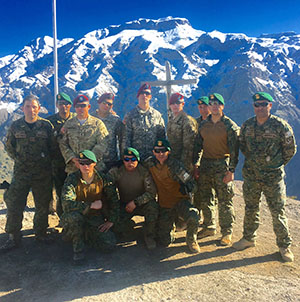Texas Guardsmen graduate Chilean Mountain School
Story by: Sgt. Elizabeth Peña
Texas Military Department
 Texas Guardsmen attend the Chilean Mountain School course August 15-26, 2016 in Portillo, Chile with Chilean army soldiers. The 10-day course consisted of basic competencies on movement, maneuvering, and life-saving techniques in spring and winter mountain terrain. Through these military exchanges, soldiers are given the opportunity to experience new types of operations. (Courtesy Photo)
Texas Guardsmen attend the Chilean Mountain School course August 15-26, 2016 in Portillo, Chile with Chilean army soldiers. The 10-day course consisted of basic competencies on movement, maneuvering, and life-saving techniques in spring and winter mountain terrain. Through these military exchanges, soldiers are given the opportunity to experience new types of operations. (Courtesy Photo)
RIO BLANCO, Chile – Twenty-one Texas Guardsmen successfully completed the “Escuela de Montaña” Chilean Mountain School short course August 15-26, 2016 in Rio Blanco.
“The course was designed as a two-week synopsis of their four-month long mountain warfare course, which is similar to our Ranger school,” said Texas Army National Guard 1st. Lt. Michael A. Affeldt, scout platoon leader of the 1st Battalion (Airborne) 143rd Infantry Regiment, and officer in charge of the Texas military exchange for the course. “So it’s a pretty prestigious course to go through in Chile.”
The 21 Guardsmen had to score at least a 290 on the Army Physical Fitness Texas, speak Spanish and have previous experience in cold weather and mountain terrain. The course consists of basic competencies on movement, maneuvering and life-saving techniques in spring and winter mountain terrain.
“The course starts off in Rio Blanco, which is at the base of the mountains. It was 30 degrees at night and 65 degrees during the day,” said Texas Army National Guard Cpl. Nicholas C. Graff, fire team leader with the 143rd Infantry Regiment.
The first phase focused on summer climbing techniques such as rock climbing, repelling, ascending and water crossings.
“We practiced pack animal training so we used mules,” said Graff. “They use mules to carry gear where they can’t get vehicles. All the stuff that we did in the summer phase, led into a culminating event for the winter section.”
The second phase consisted of winter operations such as, cross-country ski, downhill skiing, medevac and foreign weapons familiarization.
“We also dug snow shelters that we slept in a couple nights. Digging ice caves was a lot of fun,” said Graff.
Texas’ coldest winters couldn’t hold up to the Chilean seven-degree mountain climate, but Affeldt said his Soldiers kept perseverance throughout the course.
“Downhill skiing was a struggle in itself, then they threw in cross-country skiing, which is a little bit more difficult. So the first day everyone was kind of looking like Bambi, but by the end of the week we were able to climb up mountain and do a company exercise,” said Affeldt.
Through these military exchanges, soldiers are given the opportunity to experience new types of operations.
“The ability to sit down with another army and to be able to hang out with people of a different culture, and see the world through their eyes was incredible,” said Affeldt.
Texas National Guard and Chile have been working together since 2009 though the National States’ partnership program. The program is managed by the National Guard Bureau, and is designed to link a state’s National Guard with a partner nation’s military forces and government agencies in a cooperative, mutually beneficial relationship.
“The way it benefits the Texas Military Department is the ability for us to take soldiers from across the division and entire state and send them to an environment to train in that we don’t have the ability to train in,” said Affeldt. “Now we have Soldiers coming back that understand how to do operations in cold weather climates, mountainous terrain and how to deal with adversity in different environments.”
Although the training environment between Chile and Texas may differ slightly, military-to-military battle rhythms are quite similar.
“The army values were a major part of the training,” said Affeldt. “It took large amounts of personal courage for some to overcome uncomfortable and new situations, but when it comes down to it, duty and honor wouldn't let us fail.”
Last year, the Texas Military Department conducted 14 military exchanges with Chilean partners that included engineering, medical and disaster response as well as the best warrior competition.
“It’s crazy that the soldier mentality transfers that far,” said Graff. “They like to train, they like to go hard everyone seemed to get along really well. The best thing we did was build relationships down there and learning how to interact with them and who they are as people. I made some good friends.”
The Texas Military Department is scheduled to host their Chilean partners this November to conduct search and rescue training at Camp Mabry in Austin, Texas.